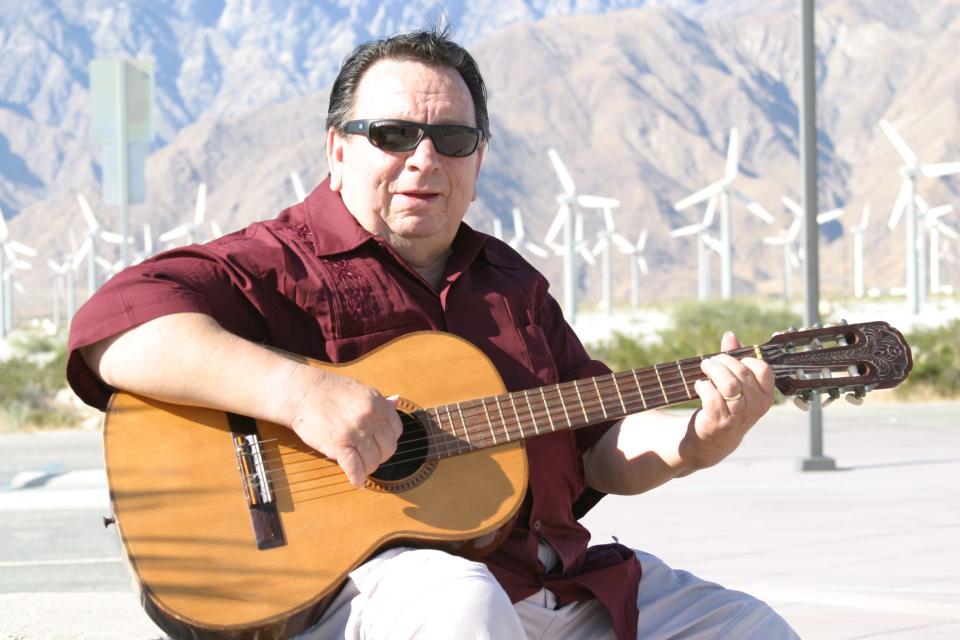Late songwriter Chan Romero's short yet impactful career left mark on Latino rock scene
In 1963, The Beatles performed the song "Hippy, Hippy Shake" on the BBC radio programs "Magic Hour" and "Pop Go The Beatles," but like many of the Fab Four's early hits, it was a a cover of an American rock 'n' roll song.
"Hippy, Hippy Shake" was written by Latino rock 'n' roll musician and longtime Coachella Valley resident Chan Romero. It was released in 1959, when he was 17 to little fanfare in the U.S., but was a hit in Australia. The song was later covered by The Swinging Blue Jeans, Davy Jones of the Monkees, The Georgia Satellites and more. It also appeared in the films "Cocktail," "Austin Powers" and "Angels in the Outfield."
Romero died at age 82 on April 21 in Cathedral City, six months after the death of his wife of 64 years, LaVerne Romero.

Much of the 'Hippy, Hippy Shake' songwriter's music was never released
Romero told The Desert Sun during a 2007 interview that he wrote hundreds of songs but only recorded a handful. According to Montoya Entertainment Group President Manny Montoya, an unreleased album recorded in 2006 titled "Right Track" will be released posthumously later this year.
A native of Billings, Montana, Romero grew up idolizing Elvis Presley and hitchhiked to Los Angeles after hearing Ritchie Valens' song "Come On Let's Go," which was released on the L.A.-based Del-Fi label in 1958. His cousin had an electric guitar and amp and Romero started playing it. Thirty minutes later, he had written "Hippy, Hippy Shake."
Chan recorded the song on Del-Fi shortly after Valens, the subject of the 1987 film "La Bamba" starring Lou Diamond Phillips, died in an airplane crash with Buddy Holly and the Big Bopper. It featured Valens' studio musicians, including the great jazz guitarist Barney Kessel. The hit turned Romero into Valens' heir apparent. He even stayed at the Valens family home in Pacoima and remained friends with the family.
When Romero was the first Latino to be inducted into the Rockabilly Hall of Fame in 2007, Montoya drove him to the ceremony in Green Bay, Wisconsin.
"(Romero) didn't like to fly and that goes back to 'The Day the Music Died' when those three great artists died," Montoya said.
Chan Romero made a name for himself even when Latino songwriters faced prejudice
Early rock 'n' roll fans had difficulty accepting a Latino rocker.

"In those days, it was hard, especially if you had a Latino name," Romero said in the aformentioned 2007 interview. "There was still a lot of prejudice at that time. We had some bookings in the South and, when they found out we had a mixed group, the agent said, 'We better hold off on that one.' There were some areas that wouldn't play my records because of my name."
Romero fell in love with Palm Springs during a visit in 1964 and lived part-time in Cathedral City since the 1980s. He left the recording industry but continued to occasionally perform while starting several businesses, and became an ordained minister. One of his daughters owns the Pastry Swan Bakery in Rancho Mirage.
"There was a lot of frustration when he (initially) quit, and I think part of the reason why was he became a Christian and joined a church," Montoya said. "When I started working with him about 25 years ago, I found it kind of frustrating because there weren't a lot of (recordings) out there, very little history on him and he didn't get his proper share of the music publishing. He sold the rights to 'Hippy, Hippy Shake' at one point years ago."
A Celebration of Life will be held at 2 p.m. Sunday, May 26 at Indian Wells Country Club. Survivors include his 10 children Deborah Romero, Holly Sanchez, Chandler Romero, Aaron Romero, Chanel Clipper, Samson Romero, Charity Degollado, Jordan Romero, Michael Romero, Kylie Romero, and siblings Richard Lawrence (Chon), Valentine Patricia (Tinsey) and Margaret Jane (Maggie).
Brian Blueskye covers arts and entertainment. He can be reached at [email protected] or on Twitter at @bblueskye.
This article originally appeared on Palm Springs Desert Sun: Cathedral City resident Chan Romero's legacy as Latino rocker lives on
